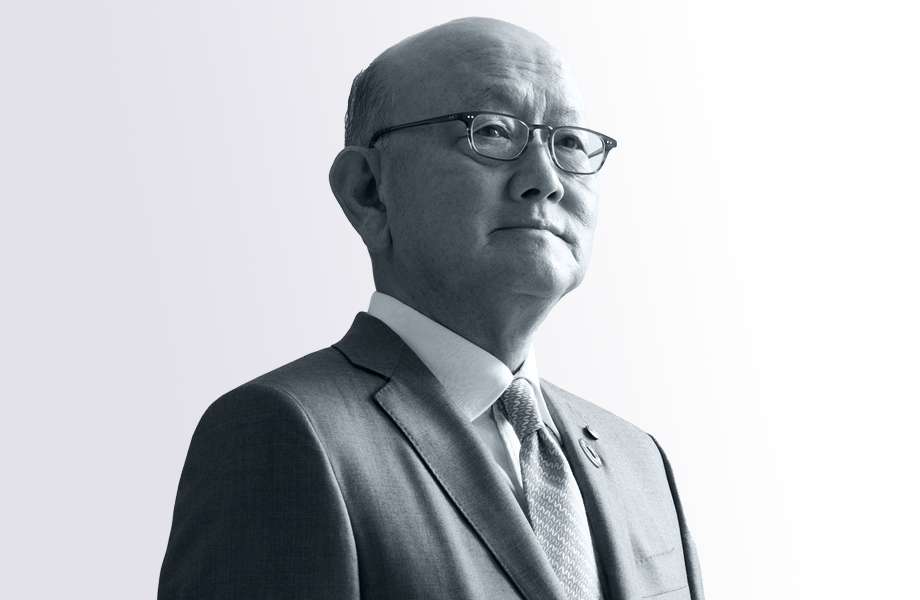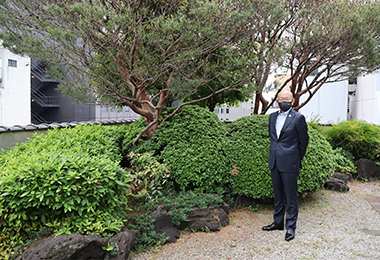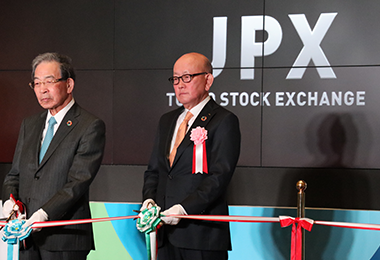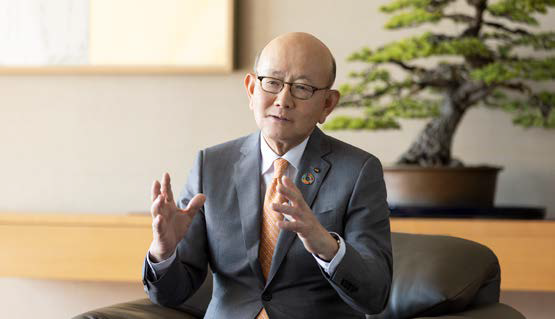CEO Message

In the new era, as we relentlessly bolster our superiority in the non-resource sector, ITOCHU will steadily continue building its foundation to unlock the intrinsic value of a market-oriented perspective.
In FYE 2022, ITOCHU shattered previous results, achieving record-high profit. In FYE 2023, we will keep a watchful eye on the incredibly uncertain economic situation and continue to steadily lay a foundation looking to the time when resource prices and exchange rates have returned to normal with the aim of building an earnings base that stably produces ¥700.0 billion based on the policies laid out in Brand-new Deal 2023.
![[画像]](./img/ceomessage_img02.png)

Tirelessly Continuing Our Efforts
Why is it good things fade, but bad things persist?
Meiji-era author Ichiyo Higuchi lived a life that embodied that conundrum. Graduating from elementary school at the top of her class, she was blocked from pursuing any higher education due to her mother’s viewpoint that, “Women do not need any more education than this. They should instead learn needlework and housework at home.” Subsequently, her older brother, who stood to inherit everything, died suddenly. Then, her father passed away after racking up massive debts due to his failed business. At just 17 years old, she took on the family’s finances and her father’s debts. She regularly took out loans and pawned her belongings. The home goods and candy store she started did not do well either. Even amid this poverty, she worked hard as a novelist and put out one history-making story after another, becoming a very popular writer in just over a year. Alas, at just 24 years old, her life was cut short when she suddenly came down with tuberculosis, which was wide-spread at the time. Despite all her hard work, nothing good lasted long. You cannot help but be moved by her hard life.
And then there is the business of running a company. Some people think corporate leaders should be optimistic, but corporate management fails without the requisite effort. Putting in the work alone does not guarantee success. That, however, does not mean we should give up. I try to reflect on ITOCHU’s history, persistently strive, stay ahead, and never neglect preparations so that we never forget this mindset.
Lessons Learned from History

and employees at our old Tokyo Headquarters
In May 2022, when I heard that our old Tokyo Headquarters in Nihonbashi was being demolished, I decided to visit it one last time. We had used it from 1957 to 1980, but the structure had become run down.
The Japanese garden, which neighbored the office of then-President Echigo, remained just as it had for over half a century. Standing there, my mind drifted to the time when ITOCHU was overseen by President Echigo. He had likely gazed upon the same scene. That was an era when ITOCHU was accelerating its transition from a textile trading company to a general trading company. Numerous people at ITOCHU helped achieve the Company’s diversification, enduring repeated hardships to overcome walls thrown up by the general trading companies associated with the former zaibatsu industrial groups. I felt a rush of emotions, wondering what these people would have to say if they saw how ITOCHU is currently in the fight for the top spot. On the other hand, I experienced a mix of conflicting feelings when thinking about how it was in this very room that, in a rush to achieve diversification, the decision was made to acquire TOA Oil Co., Ltd., which was a major gamble. At a time when the Company was generating profit in the single billions of yen, the investment eventually ended up with a loss of ¥180.0 billion. Even after this investment, the Company made repeated mistakes rooted in overconfidence and complacency, such as real estate investments amid the bubble economy, and these became major burdens to the management of the Company since then. We absolutely must keep this history in mind when discussing ITOCHU’s future.
In my message last year, I wrote about allowing ourselves just “One Day of Celebration” after we achieved the “triple crown” for general trading companies. In FYE 2022, we remained ever vigilant and ended up achieving record-high profit. This is generally when people let their guard down: after good results. By regularly sharing this history internally, I have instilled vigilance in myself and employees against indulging in overconfidence. Even the slightest bit of overconfidence put us at risk of instantly slipping from the top position among general trading companies that took us so long to achieve.
Decision Aligning Our Aims with the Market
I consider the Annual Report to be very valuable in communicating management’s direction. I have been writing down thoughts I want to convey in this CEO message in a journal regularly, and one of those things is shareholder returns.
In May 2021, we announced the shareholder returns policy during the medium-term management plan period, and in June, announced that we would reset share buybacks for the time being, after which ITOCHU’s share price plunged. Although we received positive feedback on our progressive dividend policy, the main reasons for the plunge were our lack of a clear policy on the dividend payout ratio during the medium-term management plan, not disclosing the reasons for resetting share buybacks for the time being, and not providing the schedule to restart buybacks.
Previously, we had thought that no matter how high we set ITOCHU’s dividend payout ratio, it could eventually cause disappointment for investors and shareholders, as a drop in profit would result in lower dividend amounts. For this reason, we believed that if, through the progressive dividend policy, we could steadily raise the level of dividend amounts every year, even just by a little, investors and shareholders would find it more preferable and feel encouraged to hold our shares over the long term. However, through dialogues with analysts and investors, I came to the realization that there was a gap between our thinking on this and the market’s expectations.
I hope to please investors and shareholders over the medium- to long-term through increases in both dividends and share price. Since becoming President in FYE 2011, I have worked hard to ensure that the share price and dividends steadily rise, and I routinely received gratitude. When meeting with a former executive of a manufacturer that held ITOCHU shares over the long term, he extended his sincere thanks, and I have received many letters from ITOCHU’s former executives and employees. These have been the most gratifying moments as a corporate leader, and there have been many such occasions. With the recent drop in our share price, I immediately opened talks with management with a renewed drive to respond to market expectations to the extent possible going forward. Through extensive discussions, we reached the conclusion that we had already achieved the top ranking among general trading companies for our financial foundation, including shareholders’ equity, and that we had achieved the capability necessary to share more of our profit with investors and shareholders. This led to the announcement in November 2021 of our new dividend policy during the medium-term management plan, comprising incremental increases to the minimum dividend in continuation of the progressive dividend policy as well as a commitment to a payout ratio of 30% by FYE 2024. With the share buyback announcement in January 2022 and its steady execution, we received positive feedback for our proactive shareholder returns, and ITOCHU’s share price set 19 record highs during FYE 2022.(→ CFO Interview)
Businesses Contributing to “Sampo-yoshi”

This April, Tokyo Stock Exchange, Inc. restructured its market segments. I was invited to attend the ribbon-cutting ceremony as a representative for the Prime Market. To avoid dishonoring the Prime Market, as one of the representatives, and to ensure that profit is sustainably shared with stakeholders, I intend to single-mindedly practice commitment-based management to surely achieve our stated targets going forward.
ITOCHU was not alone in achieving record-setting results in FYE 2022. Every general trading company did and, with the rapid spike in resource prices, we were left a bit in their dust. The general trading companies associated with the former zaibatsu industrial groups have portfolios boosted by a high proportion of resources, but we are not shifting our growth strategy. We will remain focused on ITOCHU’s strong suit of the non-resource sector. We also garnered praise from a major overseas investor, saying, “We fully understand ITOCHU’s distinctive business model, and it is fantastic that ITOCHU is growing and steadily expanding revenues in the non-resource sector.”
General trading companies have raked in huge profits as commodity prices spiked more than ever, including those for energy and metals. As a consequence, downstream companies and consumers have been forced to shoulder the burden. However, as illustrated by history, businesses that do not gain the support of these consumers and broader society will not last for long. Events such as two oil shocks and speculative stocking of rice have taught us a lesson that such businesses not only violate business ethics but also fail. The basic philosophy of business is that even if your own profit is diminished in the short term, by allowing customers to prosper, you and your business will continue to grow as well. It is of the utmost importance that our current business model contributes to “Sampo-yoshi” and fosters sustainability.
At present, each general trading company is working to strengthen the non-resource sector. It used to be that the performance of general trading companies would rise and fall in line with resource market cycles, and they lost the trust of the market because they had to record large impairment losses. Amid the recent spike in resource prices, one may find it difficult to forget the benefits from the previous resource cycles. I fear that one could fall into the trap of treading the same path and again lose the trust of the market.
Moreover, we must not forget that the resource business is exposed to not just price volatility but also a wide range of other risks. While the Russia–Ukraine situation has partially affected the Company, if we look at the political landscape, countermeasures related to energy resources are being undertaken as a geopolitical tactic. Major tax hike proposals are being discussed, especially in Australia and South America, to capture and retain more resource benefits through higher taxation on multinational mining companies, reigniting the flames of resource nationalism. Even though it may seem like the pace of the SDGs and decarbonization is slowing, there is no real change in the underlying trend. The diverse risks facing the resource business could grow larger, but we can be certain they will never dissipate. The emergence of these kinds of risks has forced major changes to the business portfolios of general trading companies. This is why ITOCHU is divesting its thermal coal interests, a commitment we are fulfilling faster than any other general trading company. (→ COO Message)
If we stick to the conventional business model of general trading companies as it is would very likely endanger our continuation moving forward, in my view. In all industries, position of power has been shifting from upstream producers to downstream consumers. As downstream companies with customer contact points strive to seize greater profit, opportunities are shifting downstream at an accelerated rate. Accordingly, the “product-oriented” perspective businesses of general trading companies are highly likely to go under. With an eye on the time when resource prices return to normal, we will continue reorganizing our businesses from a market-oriented perspective. This issue will impact all the general trading companies, and whichever makes the shift ahead of the rest will lead the pack in the era to come. Needless to say, ITOCHU is determined to remain at the forefront of these efforts.
The Reason We Can Lead a Market-Oriented Perspective
Long ago, when I would attend menswear exhibitions for high-end tailors, I realized that it was wives and daughters who would make the buying decisions. I secured an agreement with Yves Saint Laurent, which was popular among women, to sell imported fabric and achieved success. Paying close attention to the needs of the people you are in business with and to changes, anticipating what is to come, and providing them what they seek is the basic idea behind maintaining a market-oriented perspective. This is also why I highly value and emphasize the front lines of our operations.
People have a wide range of personalities and characteristics that tend not to change. In a similar way, corporate cultures and business styles are incredibly difficult to change in meaningful ways. General trading companies associated with the former zaibatsu industrial groups have depended on large clusters of industrial businesses as their main source of power. In contrast, with our roots as a “door-to-door trader,” we have worked in close proximity to consumers to carefully nurture small sales. Though the scale of revenues may seem small, our skills are based on the Company’s day-to-day operations and insights accumulated to date. We know how to carefully nurture time-consuming, customer-centric businesses with a hands-on approach. This is not something easily attained overnight. I think this is also clearly proven in the ratio (over 90%) of Group companies reporting profits.
With many high-quality assets that are rich in customer contact points, ITOCHU is working to achieve a transformation from a market-oriented perspective. Within the Group, the FamilyMart convenience store boasts the most customer contact points. Daily sales of our existing stores have recovered a pace better than those of competitors because of the added value we provide through inter-Group collaboration under The 8th Company and improvements in marketing. We are taking steps to raise the efficiency of store operations and enhance profitability by introducing humanoid AI assistants to support ordering, automatic shelving robots, and even unmanned payment stores. In addition, we are leading the industry with our initiatives, such as advertising and media businesses, that transcend the boundaries of conventional convenience stores.
Japan’s largest imported car dealer, YANASE & CO., LTD., expanded the brand lineup of new and used cars it handles beyond mainstay Mercedes-Benz to meet consumer needs. In the North American construction materials business centered on MASTER-HALCO, Inc., we succeeded in expanding the product lineup of various fence materials and synergies through acquisitions and other activities. ITOCHU’s market-oriented transformation is not only unfolding in Japan but all over the world. As such, our strategy is to take charge of customer contact points, provide added value to expand contact points, and take the initiative in the supply chain.
In addition, the presence of the ICT & Financial Business Company is a distinctive feature of ITOCHU which has been regarded positively. We have steadily accumulated insights related to ICT and are currently analyzing data gained from customer contact points. This will prove a major strength to produce new added value and is leading to greater differentiation from our competitors. ITOCHU does not aim to realize some grandiose concept of building an industry-wide platform. Rather, we are promoting a frontline-centric DX that leads to stronger profitability for each business and transforms our business model. For example, optimizing the supply chain using FamilyMart’s downstream data has already brought about a steady improvement in our profit generation capability.
Another key distinctive feature is the Textile Company, the only one among the general trading companies. Our tender offer bid for DESCENTE LTD. caused a stir at the time, but based on the current transformation of our business model and enhancement in profitability, I am confident that we made the right decision. I believe this case illustrates the benefit of continuing to maintain the Textile Company, as this enables various insights to be pooled into the strength of ITOCHU’s non-resource sector. As such, we are promoting business transformation from a market-oriented perspective, especially in the non-resource sector, while executing investments like these that go beyond conventional boundaries, as we build up our pipeline. (→ SPECIAL FEATURE Merchants Who Continue to Transform)
Even amid the pandemic, we fast-tracked asset divestment and explored the timing of our new asset replacement. Going forward, given equity markets are likely to remain weak, we are likely to be presented with potential investment opportunities. In addition, considering the current level of exchange rates and unstable overseas situations, I think it is more strategic and effective to prioritize domestic investments over overseas ones for the time being.(→ CSO Interview)
On the other hand, while keeping an eye on a potential reversion of exchange rates, we intend to pursue a credit rating upgrade from Moody’s and aim for a more competitive cost of funding overseas than ever before.
We will continue to relentlessly spread seeds for new businesses in the non-resource sector, our strength. When resource prices eventually return to normal, we will fully tap into the intrinsic value of our market-oriented perspective.

Well-Grounded Human Resource Strategies
I think that if companies aim to realize a sustainable society, it only makes sense that they too should be sustainable themselves.
Last year, I expressed my thoughts on climate change and GHG emissions reduction, so this time I would like to explain our work-style reforms.
We have skillfully implemented COVID-19 countermeasures and work-style reforms, namely our Morning- Focused Working System and Support for Balancing Cancer Care and Work. ITOCHU has garnered high praise from external ESG evaluations and many company rankings among job-seekers. Such kinds of external evaluations make me feel grateful and prove that we are widely regarded as a sustainable company. These kinds of initiatives by ITOCHU are connected to the “good for society” aspect of “Sampo-yoshi,” as demonstrated by the overarching effects on society as a whole, going beyond just our own company and affecting the public and private sector alike.
In October 2021, we established the Women’s Advancement Committee, through which we are accelerating our support for women’s advancement. Former Vice-Minister of Health, Labour and Welfare and Outside Director Atsuko Muraki serves as chair of the committee, in which half of the members are outside officers and half are women. I believe similar measures are being taken by many other companies. However, our approach is rare in that we have established the committee as an advisory committee to the Board of Directors, which exemplifies the Company’s commitment to this matter. Based on the discussions of this committee and the results of a largescale engagement survey, ITOCHU moved to the second stage of work-style reforms, building on the reforms undertaken to date.
As previously discussed, ITOCHU’s human resource strategies are essentially its management strategies in and out of themselves. When addressing the sustainability of the Company, we need to ensure that we enhance labor productivity. Moreover, as a company with its competitive advantage in customer contact points, we see an increasing necessity for accelerating development for promoting women. The evolution toward flexible work styles will therefore be indispensable. In the second stage of workstyle reforms, we will refrain from getting caught up in novelty or setting unrealistic targets. We intend to instead take thorough, well-grounded measures that will help enhance corporate value. (→ CAO Interview)
Furthermore, we can see the results of the suite of work-style reforms undertaken by the Company. The birthrate of ITOCHU’s female employees was 0.60 in FYE 2013, but later rapidly rose to 1.97 in FYE 2022, compared with a national figure of 1.30 and just 1.08 in Tokyo*. Although there are various options when it comes to personal life events, it is very important as a company that we ensure a culture and systems that enable our employees to raise children while pursuing their careers, and this result backs that up.(→ Women's Advancement Committee)
* Total annual fertility rate for 2021 in population dynamics by the Ministry of Health, Labour and Welfare (estimates)
Tapping into Intrinsic Value in the New Era
Currently, there is growing alarm over deceleration in the global economy due in part to inflation that has accompanied rising geopolitical risks and increasing interest rates, especially in Europe and the United States. This is overshadowing expectations of post-pandemic recovery. The uncertain business environment has defied logic, but ITOCHU is carefully monitoring changes to thoroughly instill the “earn, cut, prevent” principles that serve as our business fundamentals. We will continue to relentlessly spread seeds for new businesses in the non-resource sector, our strength. When resource prices eventually return to normal, we will fully tap into the intrinsic value of our market-oriented perspective.
